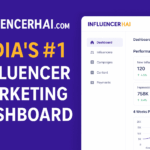Influencer marketing is increasingly popular for businesses of all sizes and industries. However, when it comes to B2B (business-to-business) and B2C (business-to-consumer) influencer marketing, there are some key differences to be aware of.
B2B influencer marketing typically focuses on connecting with industry experts and thought leaders with a strong presence within a specific niche or industry. These influencers deeply understand the products, services, and challenges that businesses in that industry face, and they are often well-respected and trusted by their peers. B2B influencer marketing is often used to generate leads and increase brand awareness among decision-makers in a specific industry.
On the other hand, B2C influencer marketing typically focuses on connecting with individuals who have a large and engaged following on social media. These influencers are often known for their brand and lifestyle, and they can influence their followers’ purchasing decisions. B2C influencer marketing is often used to drive sales and increase consumer brand awareness.
The key difference between B2B and B2C influencer marketing is the type of influencer you should target. B2B influencer marketing requires a more targeted approach, as you will need to find influencers relevant to your specific industry and have a strong presence within it. You can research industry publications, attend conferences and networking events, and reach out to influencers directly.
Researches industry publications, attend conferences and networking events and reaches out to influencers directly to find relevant B2B influencers.
On the other hand, B2C influencer marketing often requires a more general approach, as you will need to find influencers with a large following who are relevant to your target audience. You can do this by researching popular social media platforms, such as Instagram, TikTok, and YouTube, and identifying influencers who have a large following and are relevant to your target audience.
Another key difference between B2B and B2C influencer marketing is the shared content type. B2B influencer marketing often involves creating and sharing more technical and informative content relevant to the industry. This can include white papers, case studies, product demonstrations, and industry reports. B2B influencer marketing focuses on lead generation and brand awareness rather than direct sales.
On the other hand, B2C influencer marketing often involves creating and sharing more visually-appealing and lifestyle-oriented content relevant to the target audience. This can include product demonstrations, tutorials, and unboxing. B2C influencer marketing also tends to focus on direct sales and to increase brand awareness.
B2B influencer marketing also differs from B2C in terms of the goals and metrics to track the campaign. B2B campaigns often focus on lead generation, brand awareness, website traffic, and engagement metrics like click-through rate, open rate, and conversion rate.
B2B campaigns are also often longer-term and require a more strategic approach. On the other hand, B2C campaigns focus on direct sales, brand awareness, and engagement metrics like likes, comments, and shares. B2C campaigns are often shorter-term and require a more tactical approach.
Another key difference between B2B and B2C influencer marketing is the budget. B2B influencer marketing campaigns tend to have a larger budget, as the cost of reaching the target audience is generally higher. This is because B2B influencer marketing campaigns often require more specialized content, such as white papers and case studies, which can be more expensive.
On the other hand, B2C influencer marketing campaigns tend to have a smaller budget, as the cost of reaching the target audience is generally lower. This is because B2C influencer marketing campaigns often require more visually-appealing and lifestyle-oriented content, such as product demonstrations and unboxings, which can be less expensive to produce.
In conclusion, B2B and B2C influencer marketing are both effective strategies for businesses, but they are quite different in terms of the type of influencer, content, goals, metrics, and budget.
B2B influencer marketing is typically more targeted and focuses on connecting with industry experts and thought leaders. In contrast, B2C influencer marketing is more general and focuses on connecting with individuals with a large social media following.
Businesses should consider these differences when planning and executing their influencer marketing campaigns. They should also be aware of the goals they want to achieve, the metrics they want to track, and the available budget.
By understanding the key differences between B2B and B2C influencer marketing, businesses can create practical and efficient campaigns that help them reach their target audience and achieve their business objectives.
Influencer marketing platforms are great for businesses to connect with influencers and create effective campaigns. Some of the top influencer marketing platforms are:
These platforms provide businesses access to a large pool of influencers and make it easy to find authentic influencers for their influencer marketing campaign. They also offer a range of tools and features to help businesses manage and measure the success of their campaigns, making it easier to achieve their marketing goals.
